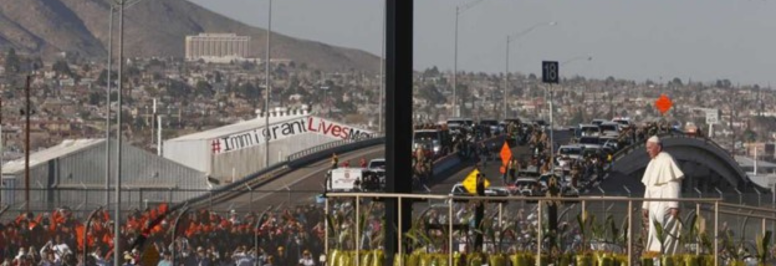By Petra Alexander
Pope Francis has often been called the First Pope of the Global Era because his Magisterium arose from a deep understanding of a globalized world—one in which economic systems have cast aside countless “discarded” individuals. Our global society competes for markets and produces intolerable violence, turning many into refugees and asylum seekers. Added to this are climate disasters and religious conflicts that force countless people into displacement.
For Pope Francis, immigration cannot be addressed merely by punishing those who cross man-made borders, but by transforming the social structures and dynamics that fuel today’s human mobility.
Why did Pope Francis’ Magisterium on immigration generate such controversy? Because many failed to grasp how deeply it is woven into Catholic Social Doctrine and his broader theological vision—where immigration emerges as a central concern of social morality.
Lampedusa, the tiny Italian island he visited in July 2013 that had witnessed the death of 368 migrants attempting to cross the Mediterranean from north Africa, marked the beginning of the Pope’s profound pastoral encounter with the broken dreams of so many. It was there that he rekindled the timeless Gospel question: “Who is my neighbor?”—a question he carried with him on apostolic journeys, in his meetings with political leaders and heads of state, in his encyclicals, and in countless public messages.
To understand immigration today, Pope Francis calls us to shift our perspective: from a political lens to one of mercy. He invites a “Church that goes forth,” one that breaks the circle of “only the pure.” We are called to leave behind the comfort of an exclusive citizenship rooted in nationalism, and instead embrace those cast out by economic, political, or religious systems. Mercy compels us to recognize the immigrant not as a criminal, but as a person discarded by society.
Pope Francis left a rich Magisterium in his annual messages for the World Day of Migrants and Refugees. In 2018, he declared:
“To every human being forced to leave their homeland in search of a better future, the Lord entrusts them to the maternal love of the Church.”
The Holy Father knew that many people of goodwill ask themselves, “And what are we going to do?” In response, he offered a concise program in the verbs: welcome, protect, promote, and integrate. These verbs call us to a renewed sense of global co-responsibility and Christian fraternity.
To truly grasp Pope Francis’ vision of immigration is to weave together the threads of his encyclicals, to share stories in a spirit of synodal listening, and to build bridges of universal fraternity—Fratelli Tutti (2025). It is to recognize that God created a world for all, and that the Church is a home where everyone belongs.
Shortly before his death, Pope Francis sent a letter to the bishops of the United States reaffirming one of the central threads of his Magisterium: a well-formed conscience. Forming our conscience is a lifelong task. Meditating on the Parable of the Good Samaritan shapes us to constantly recognize the dignity of every human being. It grants us an interior compass capable of discerning violations against that dignity—especially when it comes to the most vulnerable, like migrants and refugees.
When we affirm the infinite dignity of all, our own dignity as individuals and as communities also grows.
Petra Alexander is the Director of the Diocesan Office of Hispanic Affairs


